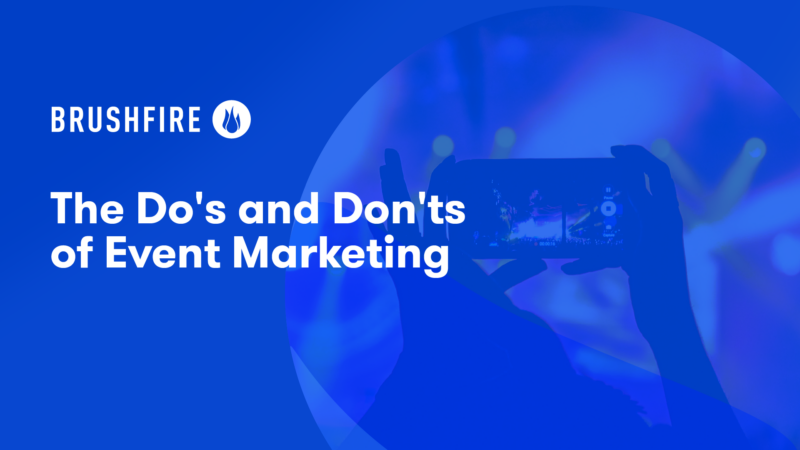There are countless event marketing tips and tricks that organizations are likely aware of. But just as important as those tips and tricks are the tactics that event planners should avoid at all costs. Let’s take a closer look at some of the do’s and don’ts of event marketing so that your organization knows how to effectively attract, engage, and excite your audience.
Do: Make it Easy to Register
If your organization puts on an event but no one attends it, did it actually happen?
Before you can start planning the intricate details of your event, you need to make sure your event registration process is as efficient and effortless as possible for attendees. Registration is also the time prospective attendees will form a first impression of your brand, so optimizing the experience in a way that gets them excited about your event is a must.
A recent study found that the average abandonment rate for online event registration forms was 9%. That may not seem like cause for concern, but let’s say you’re hoping to have 100 registrations for your event. With a 9% abandonment rate, that’s nine attendees that you could be missing out on due to your registration form being overly complex, thorough, or long.
Keep your event registration form short and sweet, and make it easy for attendees to access it no matter what device they’re using. Cut out the irrelevant questions and only ask for the most important details from your attendees. The less time people have to spend filling out their registration forms, the lower your abandonment rate will be.
Don’t: Overwhelm Your Attendees
It’s exciting to see event registration forms trickle in, and you likely want to take advantage of your bolstered email list and put content and marketing material in front of them. But spamming your attendees with generic, non-personalized information will only work to push them away.
You’ll have plenty of time to engage with your audience once the event takes place, so only reach out to attendees with event-related information leading up to the big day. Consider what content will be legitimately useful to them, such as the time and date of the event, how they can attend (whether in-person or virtually), and what they can expect to learn by attending.
Do: Utilize the Power of Video
According to Animoto, 93% of businesses score new customers from video marketing on social media. When we look at event marketing specifically, a study from Eventbrite shows that 94% of event managers who use video say it’s effective. But even though all signs point to video being an effective event marketing tool, 57% of event managers didn’t use video at all.
Video may seem like an intimidating medium, but in reality, organizations can create video content without too much legwork. Essentially, if you have a smartphone, you’re in business. Whether you use video content to generate buzz around the event or highlight keynote speakers that will be attending, your attendees will enjoy a more engaging content medium that can be easily accessed and digested without too much thought or effort on their end.
Don’t: Rely Solely on Traditional Advertising
Organic engagement is your ticket to forging genuine relationships with your audience. Many event marketers utilize paid advertising platforms to get the word out about their events. Traditional advertising is certainly helpful in targeting your ideal attendees by location, occupation, age, and other factors, but organizations are starting to realize that educating and relating to your audience is a critical first step before you can push them to take action.
70% of people prefer to learn new information from an article or blog post instead of traditional advertisement. Putting out educational content alongside your advertisements will diversify the information you’re putting in front of prospective attendees and get them more interested in your brand and events.
Do: Use Data to Your Advantage
How do you know whether your event marketing efforts are paying off? A good place to start is by collecting, analyzing, and acting on prior event marketing data to see what content is performing well and where adjustments are needed.
Many organizations might feel overwhelmed when it comes to data management. Research from Eventsforce found that more than 80% of event planners view data management as a consistent and growing challenge for their organizations. Luckily, platforms such as Google Analytics, Facebook, LinkedIn, and Data Studio are relatively easy to learn and use, and can provide your organization with valuable insights that enable you to fine-tune your event marketing strategies in the future.
Don’t: Stop Engaging with Attendees After the Event
The work doesn’t stop once the event wraps up. In fact, it’s just getting started. Post-event engagement is your time to nurture attendees and get them to take the desired action, whether that’s becoming a repeat customer or signing up for your newsletter.
Since you now have email addresses for all attendees, you can stay in touch with them and send relevant, insightful content to their inboxes. Remember — attendees have no time for spam or unrelated information from your organization, so ensure your engaging with them in a genuine, meaningful way.
Creating a post-event survey to gauge attendee satisfaction or posting a blog that sums up the main talking points of the event are both effective types of marketing material you can share with attendees once the event is over.
Elevate Your Event Marketing Game
As the world slowly begins to reopen and organizations start to host both in-person and hybrid events, event marketing will become increasingly important in the coming months. Optimizing your event marketing strategies today by following the do’s and don’ts mentioned above can position your organization for more attendee registrations and better engagement with your audience after the event.
If you’re hosting a hybrid event in the near future, Brushfire is here to help. Check out the following blog to learn how you can plan and host a successful hybrid event.

